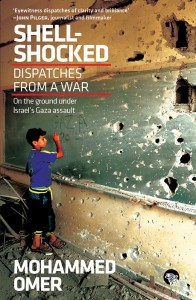
Publisher: Speaking Tiger Books
Operation Protective Edge, launched in early July 2014, was the third major Israeli assault on the Gaza Strip in six years. It was also the most deadly. By the conclusion of hostilities some seven weeks later, 2,200 of Gaza’s population had been killed, and more than 10,000 injured.
In these pages, journalist Mohammed Omer, a resident of Gaza who lived through the terror of those days with his wife and then three-month-old son, provides a first-hand account of life on-the-ground during Israel’s assault. The images he records in this extraordinary chronicle are a literary equivalent of Goya’s “Disasters of War”: children’s corpses stuffed into vegetable refrigerators, pointlessly because the electricity is off; a family rushing out of their home after a phone call from the Israeli military informs them that the building will be obliterated by an F-16 missile in three minutes; donkeys machine-gunned by Israeli soldiers under instructions to shoot anything that moves; graveyards targeted with shells so that mourners can no longer tell where their relatives are buried; fishing boats ablaze in the harbor.
Throughout this carnage, Omer maintains the cool detachment of the professional journalist, determined to create a precise record of what is occurring in front of him. But between his lines the outrage boils, and we are left to wonder how a society such as Israel, widely-praised in the West as democratic and civilized, can visit such monstrosities on a trapped and helpless population.
The author: Mohammed Omer
REVIEWS:
“Mohammed Omer could easily have escaped the horror of Israel’s impending assault on the trapped and helpless people of Gaza. Instead, he chose to stay, to record, in searing and vivid detail, the savagery of Israel’s latest escapade of ‘mowing the lawn’ and the steadfastness of the victims of a hideous tragedy. Few can match his courage and integrity, but all of us who live in countries providing the arms and diplomatic support that made Israel’s actions possible should ponder his words and ask ourselves what has been done in our name and what we should do about it.” — Noam Chomsky
“Read Shell-Shocked. It’s author says, ‘I’m a journalist and I owe it to my people and the Israeli people to get to the truth.’ Thank you, Mohammed, the truth is like water, a basic necessity – without it we will not survive.” — Roger Waters
“Written with painful immediacy, these are more than dispatches from a war zone: They convey the human reality of people who manage to survive and endure in conditions that have grown grimmer and more inhumane over the years.” — Rashid Khalidi
“With a terrible and necessary exactitude, Mohammed Omer’s war chronicle lets the world know the devastating losses borne by the Gazan people bombarded by Israeli forces in 2014.” — Judith Butler
“The truth about Israel’s crimes in Gaza can never be forgotten, never successfully lied about and covered-up, because Mohammed Omer was there. This great reporter and his family were under fire day after day. When I phoned him, I could hear the explosions outside his front door. Yet, day after day he produced eyewitness dispatches of such clarity and brilliance that, almost single-handed, he reclaimed the honour of real journalism.” — John Pilger
“From the very heart of Gaza, a witness to war: history will record Mohammed Omer’s searing testimony about what was done to his homeland by Israel’s ‘Operation Protective Edge’ … This is journalism of the highest order.” — Jon Snow, Channel 4 News
“If you only have time to read one book on Israel’s 2014 war on Gaza, let it be this one. Mohammed Omer’s on-the-ground reporting is stunning and unforgettable, giving access to a daily reality few can imagine let alone endure. Omer describes the landscape of Palestinian life and death in this tiny strip of land during this horrific period. Yet, his accounts are not only about the immense suffering of Gaza’s people but about their remarkable resilience and dignity, which cannot be destroyed. An act of conscience and documentation, Omer’s book will remain with the reader long after it is read.” — Sara Roy
